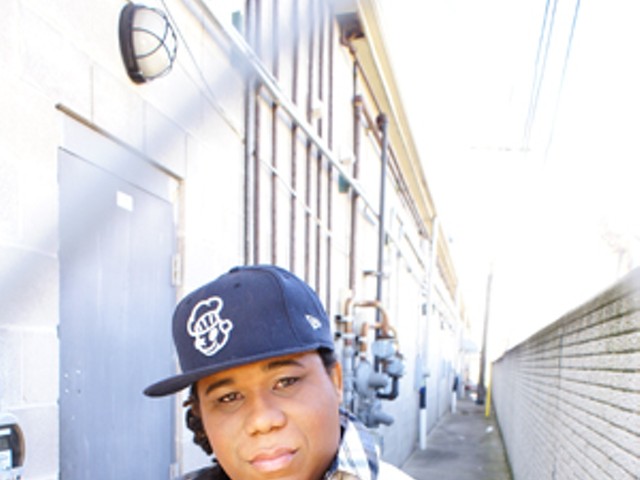Rain is pounding the roof of Sean Blackman's Clawson bungalow. He and his main collaborator Pathe Jassi are in an open attic room; tapestries decorate the walls, a sword sits by the stairway, and instruments from around the world are strewn across the floor. Jassi hands Blackman back his nylon-string guitar and picks up the bass laid out on the floor — almost too tall to stand upright under the slanted ceiling — as the two toy around on Jassi's "Touky." Appropriately, the title translates as "to travel, or an exodus," Jassi says. And in a few days, Blackman and Jassi will trade the cozy confines of Blackman's practice space and move to the ornate digs of a Detroit mansion formerly owned by Max Fisher. That's where Blackman, Jassi and other Detroit musicians will be joined by dancers and musicians flying in from Armenia, Brazil, Senegal and elsewhere to rehearse In Transit, Blackman's five-years-in-the-making vision being staged Friday at the Orchestra Hall.
"This project, this show, is basically what I'm made of. It's everything I've freakin' done my whole life, building up to this point. I feel like I've figured out what to do with my life; it's like the launching of my career. Playing around town, that's all I've done, play bar gigs, restaurants, festivals, corporate events, backyard parties. From really, really high-profile things to coffee shops, and everything in between," Blackman says between bites of homemade ratatouille his mother had dropped off earlier in the day, "At that point, I reached a glass ceiling and it was definitely time to come up with something. That was about five years ago when I recorded the album."
Blackman, 40, is a lifelong Detroiter — his Armenian parents raised him just off of Eight Mile in Oak Park — but he has always searched out all the sounds the world has to offer. A "teenage rock dog," Blackman grew up with Armenian church ditties mingling on top of Black Sabbath, Youssou N'Dour and WDET's longtime host Judy Adams, with every genre fighting for time on the stereo. Now a good bit older, Blackman still seems to have a world music juke-box playing nonstop in his head.
"When I compose a song in my head, I'm familiar with all these different instruments from around the world. In one song, I'll hear an African harp mixed with an Armenian kanun [a 76-string zither], and I'll hear a Brazilian percussion instrument. If I don't do it and get it out of my head, I'll lose my mind. I lived in Brazil for four months. I went there kind of on a musical pilgrimage. All my vacations are based around music. So I went to Spain, because I started freaking out about flamenco. It's the metal of the nylon acoustic string guitar. These dudes on the nylons are doing these ..." he says as he grabs his guitar off the bed and rips into an Eddie Van Halen finger tap. "It's like Metallica! It's not classical. You can hear the strings bending under their fingers, and they're beatin' on their guitars. The singers are turning red in the face. It's intense. When I say it freaked me out, I'm not kidding, this is unworldly."
When the idea of pulling all of his influences together into a single expression took hold of him, he refi-ed his house, and with the $25,000 cash set out to assemble the talent to help him record In Transit. Jassi, who began his career in Dakar, Senegal, before relocating in Detroit, was key, Blackman says, recalling their first meeting.
"When Pathe first came to my house, I was showing off my collection of African music and he goes, "Yes, man ... I'm on that CD." I gave him four records that I've owned for years, records that I listen to all the time! I pull out the liner notes — 'Pathe Jassi.' 'Yes, man.'" Blackman recalls, laughing while Jassi sits modestly grinning as he strums the standup bass.
With the help of Jassi, Blackman was able to pull in heavyweight musicians — including sidemen for Senegalese superstar Youssou N'Dour, one of Jassi's former employers — to the now-defunct White Room Studios in Detroit. There Blackman would pit musicians from around the world against some of Detroit's world-class jazz talent to create the unique melding of world jazz. Even in an era when artists routinely collaborate by e-mailing digital tracks, the acclaimed Buena Vista Social Club disc was a model for what he wanted: acoustic musicians seated in a circle, recording live with no overdubs, which was already an anachronism when that disc was made in the late '90s.
"So Pathe says, 'Well I know the guy who recorded that record: Jerry Boys. Yeah, I've got his number in my wallet.' So he got Jerry on the phone in London," Blackman says. Boys was sold on making his first trip to Detroit to record the group, which ultimately included local jazz mainstays such as clarinetist Wendell Harrison, singer James Wailin, and percussionists Larry Fratangelo and Mark Sawasky, plus the international contingent that included Armenian kanun player Ara Topousian and the master of the African harp called the kora, Mady Kouyate — a crew of 14 instrumentalists and vocalists in all.
But then there was the problem of convincing one of what Blackman describes as the half-dozen high-level world music labels to put the disc out: "I made all these business trips, flew all over to meet them, hand them the record. But no one bit. I ran out of money and ran out of steam."
So the record gathered dust while Blackman played gigs around town to work off his mountain of debt. Five years later, he's playing the audacity card again, putting the record out independently, reassembling the international lineup of musicians, upping the spectacle quotient with four dancers — with styles ranging from Middle Eastern belly, Chinese ribbon and Brazilian samba to Senegalese sabar and chakaba (stilt dancing) — and staging it all at the historic Orchestra Hall (rolling the dice, praying for turnout, with a $60,000 budget mainly raised by private backers).
He's counting on the experience of living and rehearsing together — renting a former Fisher mansion in Detroit's Boston-Edison neighborhood — to make for some unique camaraderie between all the performers.
"Everything inside is everything your mind pictures a mansion should look like. Hand-carved cement and limestone. Oriental rugs, chandeliers and ornate velvet furniture. There's an organ built into the foyer. An organ built into the house!" Blackman says, looking over to Jassi, "So we're going to rehearse in the parlor, and we'll have a Senegalese chef coming in to serve food. We had the idea to get the house because the other way to do it is the conventional way. You get musicians and go to hotels. Give them a per diem. We didn't want that. We wanted their trip to Detroit to be an experience. Their lives are planes to taxi to hotel to the gig, back to the plane. I want them to remember this. When they leave Detroit, they're going to have a story."
And if it translates to the stage, they'll animate the story of one Detroiter's musical romance with the world.
Sean Blackman’s In Transit is at 8 p.m. Friday, Sept. 24, at Orchestra Hall in the Max M. Fisher Music Center, 3711 Woodward Ave., Detroit; 313-576-5111; tickets $21.50 and up. Pietro Truba is a Detroit freelance writer. Send comments to [email protected]





